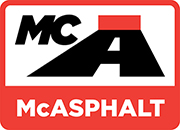SEAL COATING
…usually less than 25 mm thick and applied to any kind of road surface.
Asphalt seal coating is a broad term used to describe several types of asphalt-aggregate applications, usually less than 25 mm thick and applied to any kind of road surface. The road surface may be primed, granular base, existing asphalt or a portland cement concrete pavement.
Seals can be placed as a single lift or in multiple lifts depending on the traffic demands and the conditions of the existing surface.
Features and Benefits
- Emulsions can be used with damp aggregate, which is actually preferred
- The process does not require elevated temperatures, making it environmentally friendly
- Emulsion usage significantly reduces VOC emissions, which are typically associated with the use of cutback asphalts
- Custom formulas can be created for existing environmental conditions and using available aggregates
- Polymer-modified emulsions can be used to enhance asphalt properties for durability, stability, impermeability and early stone retention, as well as to reduce flushing and bleeding
- Renews weathered pavements
- Improves skid resistance; available in various textures
- Fine aggregate treatments can improve street sweeping
- Reduces ravelling and restores a uniform cover
- Prevents the intrusion of moisture and air
- Seals very small cracks and surface voids
- Enriches and coats weathered aggregate particles at the surface
- Delineates shoulders from traffic lanes
A chip seal, commonly referred to as a seal coat, is primarily made up of one size of aggregate that can be either washed or dusty. The aggregates can range in size from 19 mm to 4.75 mm.
A graded aggregate seal is a seal coating that uses a well-graded aggregate rolled into a high-float, emulsified asphalt, also known as a dense-graded seal. A typical gradation is 98% less than 16 mm, with 2%–7% passing the 75 mm sieve. Aggregate gradation determines the application rate of the emulsion.
A sand seal is a spray application of asphalt emulsion followed with a light covering of fine aggregate, such as a clean sand or screenings. Although this is a simple operation, it can be useful in correcting a number of pavement flaws.
A fog seal is a light application of asphalt emulsion to an existing paved asphalt surface. This type of maintenance treatment is primarily employed as an impervious sealer that will slow the rate of weathering of the asphalt in the underlying pavement.
A rejuvenating seal consists of a single application of a rejuvenating emulsion on an existing aged-road surface to restore the chemical balance at the surface and some small depth below.
